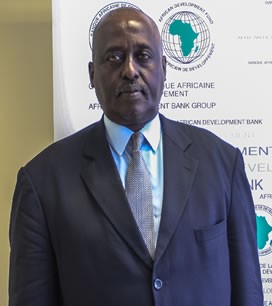- Where We Work
- Interactive Map
- Afghanistan and Pakistan
- Africa
- African Union
- Power Africa
- Trade and Investment Engagement
- Angola
- Benin
- Botswana
- Burkina Faso
- Burundi
- Cameroon
- Central Africa Regional
- Central African Republic
- Chad
- Côte d'Ivoire
- Democratic Republic of the Congo
- Djibouti
- East Africa Regional
- Ethiopia
- Ghana
- Guinea
- Kenya
- Lesotho
- Liberia
- Madagascar
- Malawi
- Mali
- Mauritania
- Mozambique
- Namibia
- Niger
- Nigeria
- Republic of the Congo
- Rwanda
- Sahel Regional
- Senegal
- Sierra Leone
- Somalia
- South Africa
- South Sudan
- Southern Africa Regional
- Sudan
- Swaziland
- Tanzania
- Uganda
- West Africa Regional
- Zambia
- Zimbabwe
- Asia
- Europe and Eurasia
- Latin America and the Caribbean
- Middle East
- Mission Directory

Questions and answers with Alex Rugamba, Director of Energy, Environment and Climate Change Department, African Development Bank
- What is the main challenge for Africa’s growth today?
The combined power generation capacity of the 49 countries of sub-Saharan Africa is around 90 GW, similar to that of the Republic of Korea. The single biggest obstacle to African businesses is the lack, and unreliability, of the energy supply.
This low level of generation capacity also translates into correspondingly low rates of electrification with over 600 million people in sub-Saharan Africa not having access to electricity, particularly in rural areas.
The African Development Bank (AfDB) is strongly committed to addressing the energy access challenge in Africa. This is why 16 percent of AfDB’s financing is dedicated to energy, the second most financed sector after transport. This is also why the AfDB agreed to be the anchor partner of Power Africa. We are also significantly involved in the UN-led Sustainable Energy for All initiative (SE4ALL) and why we host the SE4ALL Africa Hub.
- Why do you think Power Africa is important in addressing Africa’s energy deficit?
Power Africa has a focus on private sector engagement which is important to unlock investments. Some of the Bank’s recent operations related to Power Africa countries are good examples of engagement with the private sector. USAID made a $20 million, multi-year commitment to Sustainable Energy Fund for Africa (SEFA), a multi-donor trust fund administered by the AfDB. SEFA is a good example of public funds (from the Danish Ministry of Foreign Affairs and USAID) being combined with AfDB’s expertise, relationships and financing to unlock small and medium scale private investments in clean energy and energy efficiency. Through SEFA, Power Africa provides grants to private project development companies, co-sponsors the Africa Renewable Energy Fund (AREF), and supports public partners to implement enabling environment activities and PPP transaction advisory work.
Similarly, the "Beyond the Grid" sub-initiative is facilitating future investments specifically relating to off-grid and small-scale energy solutions. AfDB looks forward to supporting Beyond the Grid activities.
- What are the other programs have benefited from Power Africa’s efforts to mobilize more private investments for energy?
USAID is providing a $3 million grant for the African Legal Support Facility (ALSF), hosted by the AfDB, to provide international legal services to Power Africa country governments to better negotiate Power Purchase Agreements (PPAs). Through the ALSF, AfDB and USAID are supporting the Government of Ethiopia to negotiate the PPA for the 1,000 MW Corbetti Geothermal Project, which is expected to be the largest geothermal facility in Africa.
- AfDB is channeling a significant amount of climate finance. How does it help support the development of the power sector?
Last year, AfDB, once again, demonstrated its commitment to lower-carbon development, channeling over $700 million for climate mitigation in 2013 to sustainably address infrastructure and energy needs. Climate finance can help offset the higher up-front capital cost of climate-smart energy projects and help mitigate the risk for private investors. In the case of the Menengai geothermal development project in Kenya, concessional climate finance helped mitigate the risks related to exploration. AfDB also just approved a $12.5 million partial risk guarantee (PRG) to independent power producers to generate a total of 105 MW from the geothermal field. PRGs are a risk mitigation instrument that covers private lenders and investors against the risk of a possible government failure to meet contractual obligations to a project.
- Looking forward, how will the AfDB continue to support the sector on the continent, in particular Power Africa countries?
The AfDB will continue to play a vital role in supporting energy sector development with an emphasis on mobilizing private investment. Opportunities may include potential private sector debt financing for independent power producers in Nigeria; potential for further PRG operations in East and West Africa which will contribute towards leveraging private sector investments; and a 100 MW geothermal development project in Tanzania.







Comment
Make a general inquiry or suggest an improvement.